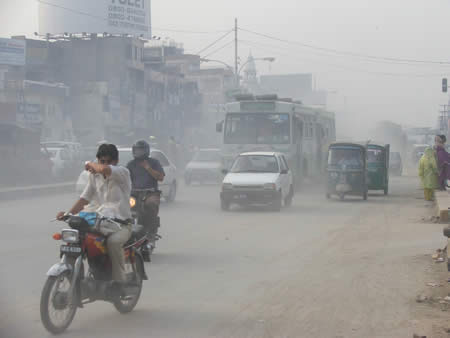Polluted air is a “public health emergency”, the World Health Organisation said on Tuesday, adding that 9 out of 10 people globally breathe bad air that is blamed for more than six million deaths a year.
The WHO warned that nearly 90 per cent of air pollution-related deaths occur in low and middle-income countries. Southeast Asia and the Western Pacific region — including China — are the hardest hit, the data showed. South Asia is also badly affected, with the WHO saying poor air quality is responsible for the deaths of more than 600,000 people in India and 37,000 people in Bangladesh every year. Published in Dawn, September 28th, 2016
Comment:
Development is needed in order for human lives to progress and modernize. With the current levels of pollution present in the world, despite progression in industry and in domestic set ups it appears that we are dying in the pursuit of such advancement and paying heavily through illnesses linked to air pollution.
China, India, Bangladesh and Pakistan were cited in the report as countries experiencing high air pollution. The report said ‘Major sources of air pollution include inefficient modes of transport, household fuel and waste burning, coal-fired power plants, and industrial activities.’ So in order to improve the situation it is imperative for governments to be leading the way and provide alternatives especially in these developing countries where coal is a cheap fuel that can be used to generate much needed energy. Transport can be basic or not environmentally friendly. Environmentally friendly alternatives can often be too expensive for the majority of people.
The WHO’s BreatheLife campaign stresses, ‘both the practical policy measures that cities can implement (such as better housing, transport, waste, and energy systems) and measures people can take as communities or individuals (for example, to stop waste burning, promote green spaces and walking/cycling) to improve our air.’ Solutions like this have been given many times before and still we are facing what they term an ‘emergency’.
To really save the world and the poorest in the world we not only need to switch to cleaner and greener fuel sources but we need a radical system change. When one looks at the root causes of environmental mismanagement and why the wrong types of fuels are used it simply comes down to what is cheapest in the short term. The world has ample sun, sea, wind and cleaner fossil fuels or even the ability to produce cleaner coal but this requires a sincere effort by an ideological leadership which feels accountability. Colonized lands are still serving their masters and not concerned about taking care of their people.
Today Capitalists rule the world and their focus is on making quick cash rather than thinking of future generations- to whom they owe nothing. Also the poor will use what is easiest and cheapest with no choice. And the middle income may wish to switch to better sources but cannot afford the switch over due to other financial constraints. As Muslims we know that Allah سبحانه وتعالى will account us and therefore we should treat the earth and its resources with due consideration. Knowing that Allah سبحانه وتعالى limits what we can and cannot consume, as well as looking at the far reaching affects of our actions.
The collective resources of the Muslim lands are ample to provide the Ummah and the world with energy and advancement that will not cost heavily in people’s health and pollute the air. The only way to address this emergency is the implementation of the Islamic Khilafah state, which will devise an overall energy policy that is linked to a belief that provides clear criterion for all actions, at individual and state level. Allah سبحانه وتعالى warns us:
ظَهَرَ الْفَسَادُ فِي الْبَرِّ وَالْبَحْرِ بِمَا كَسَبَتْ أَيْدِي النَّاسِ لِيُذِيقَهُمْ بَعْضَ الَّذِي عَمِلُوا لَعَلَّهُمْ يَرْجِعُونَ
“Corruption has appeared on the lands and the sea, because of what man has done (in terms of evil.) Allah has made them taste a part of what they earned by their hands, so that they may return (to Him).”
(Surah Ar-Rum 30:41)
Nazia Rehman

